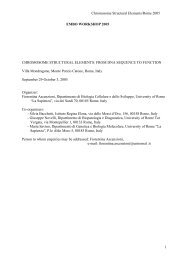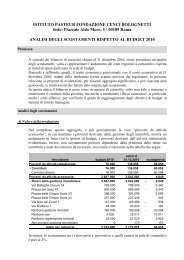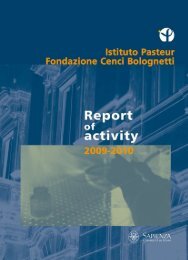download report - Istituto Pasteur
download report - Istituto Pasteur
download report - Istituto Pasteur
You also want an ePaper? Increase the reach of your titles
YUMPU automatically turns print PDFs into web optimized ePapers that Google loves.
P a r t i c i p a n t s :<br />
Michela Muscolini, PhD student; Silvana Caristi, technician.<br />
C o l l a b o r a t i o n s :<br />
Centro de Biología Molecular Severo Ochoa, Universidad Autónoma<br />
de Madrid, Cantoblanco, Madrid, Spain (Prof. Balbino Alarcón);<br />
Dipartimento di Biologia Cellulare, Università di Roma Tor Vergata,<br />
(Prof. Mauro Piacentini); Dipartimento di Dermatologia,<br />
Università di Roma Tor Vergata, (Dr. Antonio Costanzo).<br />
Report of activity<br />
The signalling pathway that leads from antigenreceptor<br />
and/or co-receptor triggering to the activation<br />
of transcription factors of the NF-κB family<br />
has a crucial role in the regulation of cell survival,<br />
and is controlled by highly similar molecular<br />
events in B and T cells. Genetic deficiencies in NFκB<br />
family members or signalling components that<br />
act upstream of NF-κB have been linked to<br />
immune deficiencies, whereas aberrant constitutive<br />
NF-κB activation has been associated with the<br />
development of autoimmune and neoplastic disorders.<br />
The understanding of the molecular mechanisms<br />
that control NF-κB activation in lymphocytes<br />
has therefore important implications for the<br />
design of novel and more specific therapies for<br />
immune diseases.<br />
CD28 is one of the most important co-stimulatory<br />
receptors necessary for full T lymphocyte activation.<br />
As a member of the immunoglobulin (Ig) supergene<br />
family, CD28 extra-cellular Ig-like domain binds to<br />
the cognate ligands, B7.1/CD80 or B7.2/CD86 on<br />
the surface of professional antigen presenting cells<br />
(APC), including macrophages, dendritic cells and<br />
activated B lymphocytes. As an integral component<br />
of the immunological synapse, CD28 plays a critical<br />
role in the recruitment of key molecules to the T cell<br />
receptor (TCR), thus lowering the activation threshold<br />
and enhancing TCR-mediated signalling path-<br />
Principal investigator: Loretta Tuosto<br />
Researcher in Molecular Immunology<br />
Dipartimento di Biologia Cellulare e dello Sviluppo<br />
Tel. : (+39) 06 49917595; Fax: (+39) 06 49917594<br />
loretta.tuosto@uniroma1.it<br />
107<br />
Cellular and molecular immunology - AREA 5<br />
CD28 co-stimulatory molecule as a key regulator of T lymphocyte<br />
differentiation and survival: characterisation of the biochemical<br />
pathways and molecules coupling CD28 to NF-kB activation<br />
ways. More recent data evidence that CD28 can also<br />
act as a TCR-independent signalling unit, by delivering<br />
specific signals, which induce NF-κB actvity<br />
and regulate the survival of primary T cells to several<br />
apoptotic stimuli.<br />
In the last years, we focused our research studies<br />
on the characterisation of the biochemical and<br />
molecular mechanisms coupling CD28 to the activation<br />
of NF-κB. We evidenced that CD28 stimulation<br />
by B7 activates, in memory CD4 + T cells, a<br />
non-canonical NF-κB2-like cascade leading to the<br />
selective recruitment of RelA/p52 and RelA/RelA<br />
dimers on the promoter of pro-inflammatory (i.e.<br />
IL-8 and BAFF) as well as anti-apoptotic (Bcl-xL)<br />
genes. We also found that CD28-induced NF-κB<br />
activation rescues T cells form ionising radiation<br />
(IR)-induced apoptosis by interfering with the<br />
binding of active p73, a member of p53 tumour<br />
suppressor family, and transcription of the proapoptotic<br />
gene bax. The analysis of the biochemical<br />
pathways regulating both transcription of antiapoptotic<br />
bcl-xL and repression of bax expression<br />
by RelA/NF-κB revealed a key role exerted by<br />
phosphatidylinositol 3-kinase (PI3K)/Akt. Indeed,<br />
CD28-induced activation of PI3K/Akt pathway<br />
leads to the recruitment of transcriptionally active<br />
complexes, containing RelA/NF-κB and the histone<br />
acetyltransferase p300/CBP, on the promoter<br />
of anti-apoptotic bcl-xL. At the same time,<br />
PI3K/Akt cascade induces the binding of corepressor<br />
complexes, formed by RelA and the histone<br />
deacetylase HDAC1, on the bax gene promoter<br />
thus inhibiting Bax expression and ensuring T<br />
cell survival in response to death stimuli.<br />
CD28 also plays a critical role in regulating actin<br />
remodelling by inducing the early cytoskeleton<br />
rearrangements events required for the recruitment<br />
and activation of signalling molecules to the membrane.<br />
We previously demonstrated that Vav-1, an<br />
exchange factor for Rac-1 and Cdc42 GTP-binding<br />
proteins, is a key upstream regulator of the sig-








